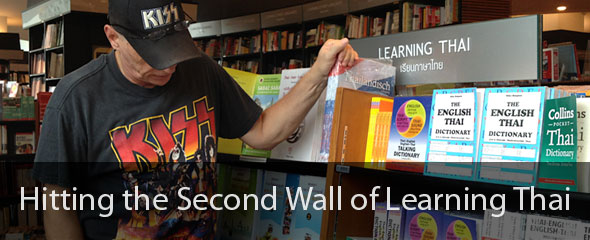
Hitting the wall when learning Thai…
There are more than enough articles out there about second language acquisition where they allude to “the wall”. This is where you know enough to meet your basic needs, yet can’t keep up with conversations spoken at speed by native speakers.
Sadly, I’ve got news for you. There’s a “second wall” and it’s a tough nut to crack.
This one happens after you’ve attained a good solid foundation in the language. By that, I mean your daily needs can be met, you can listen to most conversations, keep up, and can interject or add to conversations in a meaningful way.
People go thru phases learning another language. In the beginning you’re so happy to be able to say anything in the target language that you just blurt it out. Right, wrong, horrifically mangled, it doesn’t matter. You’re at a point where you want so badly to communicate that you say whatever comes to mind!
Then there’s the “silent phase”, where you stop spitting out the mangled version of the language and start listening to how native speakers really talk to one another. It’s not the over-pronounced, spoon-fed version you’re taught in language schools, but the real deal. This is when you really start to hone your listening skills (which, btw, hafta go hand-in-hand with speaking).
I mentioned before that Christopher Wright does a standup routine about once a year. He’s coarse, blunt and to the point about why Thais suck at English. Honestly, if a foreigner made these same observations they’d be ridiculed, castigated, or worse. But because Chris is half Thai he can get away with it.
In his routine Chris outlines the four reasons Thais don’t speak English. Surprisingly, they’re the same four reasons I stopped speaking Thai for a LONG time! They are:
- Thais are afraid the listener won’t understand what they’re saying.
- Thais are afraid IF the listener understands what they said, they (the Thai) won’t understand the answer.
- Before a Thai speaks English they hafta go thru every grammer rule they ever learned about English in their heads.
- And the 4th reason Thais are afraid to speak English is tied to “face”. Thais are afraid if they speak English incorrectly, that they’ll somehow lose face.
Anyone who’s spent time in Thailand knows that the Thai people are 100% caught up in the “gain face”, “save face”, “don’t lose face” game. It’s so much a part of their lives they almost operate on auto-pilot where face is concerned.
Not coincidentally, face is the exact same reason I stopped speaking Thai and went thru my extended silent period! Now, it wasn’t so much that I would lose face. I mean, I’m a foreigner and all, and by Thai definition I don’t have “face” to gain, save or lose. But even so, I didn’t want to look like an idiot when making my attempts at speaking Thai. I guess that could be roughly translated into “I didn’t want to lose face”. But however you want to parse it out, I stopped speaking Thai for a LONG while and listened to how Thais spoke to each other instead. I listened to the cadence, the rhythm, and the conversations. Then I’d review what I’d heard.
Due to this, I dropped a LOT of the overly polite, oh-so sugary sweet version of Thai taught in Thai language schools. That’s because I came to the conclusion that they try to teach a version of Thai they wish they spoke, but in reality don’t.
However, I digress. This article is about hitting the “second wall”. Nowadays I can hold my own with about any Thai conversation, except ones where I walk in half way thru. That’s because pronouns and designations are omitted after the first go round, so walkin’ in on an on-going conversation can give you information about someone or something, but if you missed the first part you don’t know exactly who or what they’re really talking about.
This second wall is, in my opinion, a bigger hurdle to climb. It comes about when conversations take a turn to a topic you’re not versed in, don’t know the vocab for, or are just plain out of your element.
I recently started overseeing a group of super skilled Thai tradesmen on renovation projects for foreign clientele. What I didn’t have was the vocab to talk with meaningful construction terms. Heck, I didn’t even know that there was a “plus” (ไขควงบวก) and “minus” (ไขควงลบ) screwdriver or screws until they told me. I also didn’t know that while in English we “pull wire” (be it LAN, power, telephone) in Thai they “walk wire” (เดินสาย). Another thing in the trades is that a tape measure isn’t called a ตลับเมตร like I learned in Thai school. In casual talk with tradesmen it’s called a “meter box” (กล่องเมตร).
Vocab specific conversations are much harder to grasp, and way harder to interact with in a meaningful way. Trust me, I know this from overseeing the first big contract we got. I was on thin ice over deep water tryin’ to talk to these guys (who all knew their specific trade very well) in a semi-coherent fashion, trying to avoid sounding like a compete idiot. Thankfully, I’ve known them for five years so we already had a solid relationship.
In occasions such at these, without saying เอา in all its tonal incantations (which can work in a pinch), or resorting to mime, you’re pretty much way over your head. I don’t know if I have a solution as I still struggle with it. But on this subject in particular, I now have a page or two of construction-based lingo to depend on when I get stuck.
What I’m wanting to convey to you is this: be aware that there’s another “wall” out there (or depending on how many trade specific things you interact with Thais on, several). And you’re gonna hit it someday, come hell or high water. Whether it’s like me with renovation projects, or getting your car or motorbike worked on, or talking to the True Visions guy about your cable, these things are out there. Surprisingly, IT stuff is some of the easiest stuff to talk about because almost all the words are English.
Don’t let situations like these get you down even for a second! By the time you hit the second wall, to understand what’s being said you’ll already have enough Thai under your belt to ask questions. You can ask for the meanings of words you don’t know, and you can expand your vocab and knowledge of how the language goes together in situations where it’s vocab specific.
While I’d rather quote KISS, it’s pretty much like Pink Floyd says. It’s “just another brick in the wall”. As you add bricks you’ll build a platform to climb over, and more and more “walls” in which to face.
Good luck, hope it helps.
Tod Daniels | toddaniels at gmail dot com







Funny you should mention this;
I was contacted by someone about providing a translation (both written and “real time”). I got a copy of the written text in English. It wasn’t tuff stuff by any means. I took it to three “professional” translation services (as in companies which ONLY provided translations) and paid them to do the first paragraph as a sample of their quality. Not a single นืำ of them read even close to the same and they didn’t convey the real meaning going from English into Thai. Some indeed appeared to what I call; “Bing-gles” (a combination of Bing and Google translations).
If you can’t at least read Thai a little, I wouldn’t trust a translation service here for anything other than “boiler plate” document translation. They are really hit or miss.
I also was a fly on the wall when someone hired a “real time” translator for a conversation they needed to have with a Thai in Thai. The conversation between the translator and the Thai they were talking to for the customer didn’t even resemble what they guy was saying. It’s because when Thais interact, they hafta follow “thai conversation protocol”. They have to soften stuff up, water criticisms down and sugar coat things; so that no one loses face.
I think a native English speaker who is fairly proficient in Thai would be a far better choice for “real time” translations. Mostly because “we” (foreigners) are given far more latitude in the “rules of engagement” as far as real live conversationห are concerned… At least my experience speaking Thai to Thais bears this out. I can get away with saying some pretty “ฮาร์ดคอร์” (hard core) stuff to Thais when I need to “call one on the carpet”. I believe another native speaker wouldn’t even think about saying things like that, even if they were being paid to “talk” for me.
Yes it totally agree…in every language you learn there is a second wall…but with a lot of effort (almost) everyone can break through the wall. But especially the problem with the second wall is causing a lot of people trouble and they loose their motivation. If you are in need of a translation because you are not good enough in the language and haven’t broken to the second wall use a professional translation agency to make sure you get a translation that is 100 percent right.
Interesting point Rick!
Your term sounds much more “motivating” than mine. Wall implies it’s something you can’t get thru without finding a door, a foreigner sized window or climbing over it. I think I used that term more to express the frustration I experienced when I was suddenly lacking critical vocab that I needed and felt like banging my head against a wall..
Plateau is a way better word because having lived in the south western US for most of my life (before Thailand) I can say, once you slog up onto a plateau (oftentimes no easy feat in itself) it’s pretty darned beautiful up there.
Call it what you will, it’s just one more learning curve we hafta face to become proficient Thai speakers.
I think that’s why the enrollment at certain schools which teach “business/office” Thai to foreigners is seeing an increase. It’s a type of specialized vocab you just don’t use out on the street every day and most schools just don’t teach it.
Rick, a plateau sounds almost positive so it would indeed be motivating. But doesn’t the frustration feel more like banging your head against a wall rather than a pleasant stroll doing the same ‘ole and no more?
Would it be accurate (and perhaps more motivating) if it were considered as a ‘plateau’ rather than a ‘wall’?